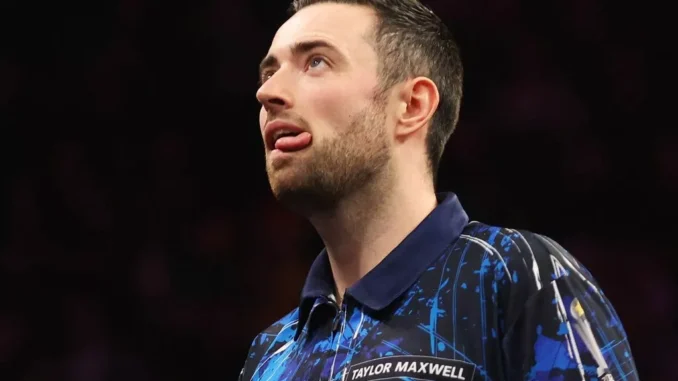
Luke Humphries, the reigning world No. 1 in darts, stood victorious yet visibly drained after a commanding 6-1 thrashing of Dirk van Duivenbode in the second round of the International Darts Open in Riesa, Germany, this Saturday night. The scoreboard told one story—a dominant display from the man known as ‘Cool Hand’—but Humphries’ post-match words painted a far more complex picture. In an emotional outpouring that caught the darts world off guard, the 30-year-old admitted he’s teetering on the edge of burnout, hinting that a break from the sport he’s dominated might be imminent. “When I’m up on stage, I am just feeling emotionless,” he revealed, his voice heavy with honesty. “It’s weird, and it’s me being honest to all the fans.”
For Humphries, this wasn’t just another win to add to his glittering resume—it was a moment of reckoning. The former world champion, who hoisted the Sid Waddell Trophy in 2024 after a thrilling 7-4 victory over teenage sensation Luke Littler, has been a relentless force on the oche. His trophy haul includes the World Masters title in February and a string of triumphs that have cemented his status as one of the game’s elite. Yet, beneath the spotlight and the cheers, Humphries confessed that the grind of an unrelenting schedule has turned his passion into a chore. “It’s not that I don’t want to be here—it just seems a chore for me at the moment,” he said, laying bare the toll of a calendar packed with Premier League nights, European Tour events, and Players Championship showdowns. “It’s just too much darts. I’m playing too much.”
The numbers back up his exhaustion. In March alone, Humphries competed in 19 matches, a whirlwind of travel and tungsten that’s left him emotionally spent. The Premier League, with its weekly battles against the sport’s biggest names, has been particularly grueling. Despite topping the standings early this year with two nightly wins in the first four weeks, his form has wavered recently—three consecutive quarter-final exits and a 6-2 semifinal drubbing by Stephen Bunting in week nine hint at a dip. “The emotion was drained from there,” he reflected after his win over Van Duivenbode. “Usually, I have the fight in me.” This time, he felt his opponent’s nerves handed him the victory rather than his own fire driving it—a stark contrast to the tenacity that’s defined his rise.
Humphries’ candor resonates in a sport where mental resilience is as crucial as a steady hand. He’s not alone in feeling the strain—Luke Littler, the 18-year-old phenom leading the Premier League by six points, has also voiced concerns about the relentless pace, admitting he barely practices between events due to the nonstop schedule. For Humphries, though, it’s more than fatigue; it’s a plea for balance. “I think I need a break,” he said, his words tinged with urgency. “I’m emotionless, and it’s not good for my mental state.” It’s a striking admission from a player who’s overcome anxiety and depression to reach the pinnacle, shedding four stone during lockdown to boost his stamina and sharpen his focus.
This isn’t the first time Humphries has faced inner battles. Years ago, he nearly walked away from darts, plagued by panic attacks and heart palpitations that threatened to derail his dream. Therapy and a renewed mindset pulled him back, but now, the sheer volume of competition might be pushing him to the brink again. “He gave me the confidence to push on and get the victory,” he said of Van Duivenbode’s shaky performance, a glimmer of hope amid his struggle. “Hopefully that has given me ammunition to go and pick up another title because I am desperate for one.” That hunger remains, but it’s tempered by a need for respite.
As Humphries prepares for Night Ten of the Premier League in Manchester this Thursday, where he’ll face Bunting in the quarter-finals, the darts world watches with bated breath. Sitting second in the standings with 20 points, he’s still in the hunt for glory—but at what cost? His victory in Riesa should’ve been a celebration; instead, it’s a crossroads. Will he power through, chasing the titles that define his legacy, or step back to rediscover the joy that first drew him to the board? “I’m playing too much,” he repeated, a mantra of a man wrestling with his limits. For now, Humphries soldiers on, but his emotional statement has sparked a broader conversation: in a sport thriving on its stars, how much is too much for even the coolest of hands?
Leave a Reply